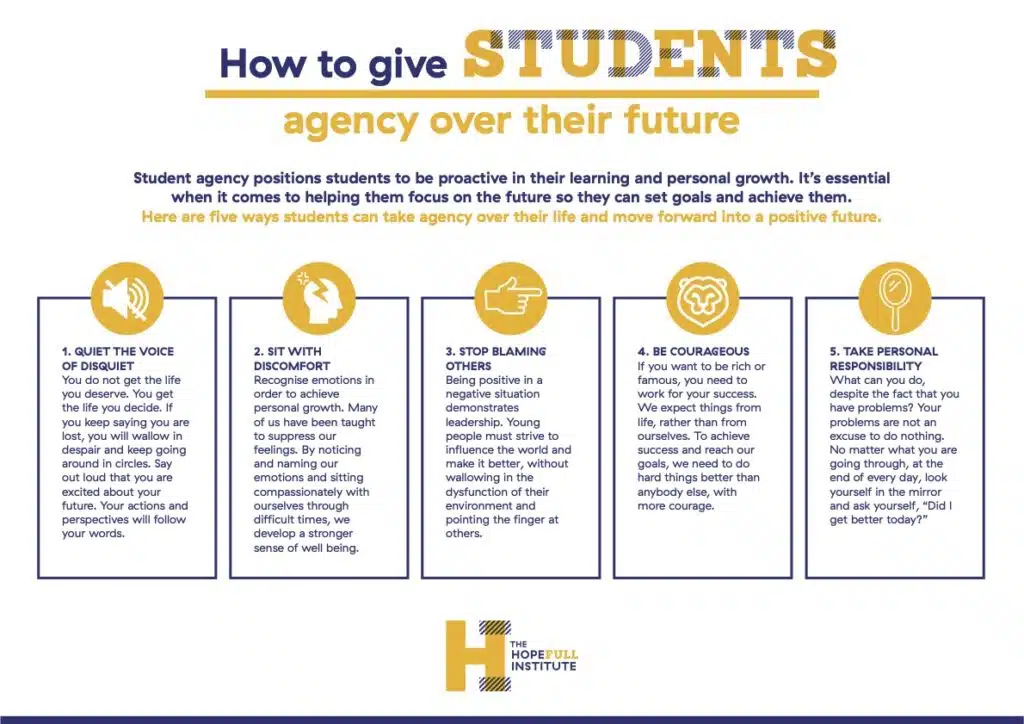Positioning students to be active agents in their learning is a powerful skill towards helping them become future focussed. Find out more.
Student agency is the competence and will a learner has to take purposeful initiative towards a desired ambition. It’s the opposite of helplessness or passivity.
Positioning students to be active agents in their own learning is a powerful skill towards helping them become future focused.
Student Agency is being talked about right now because it is a key theme in the OECD Future of Education Skills 2030. You can view their full report here.
My intention has always been to promote student agency, installing belief and hope in young people so they can take control of their lives. In fact, the formula for hope is based on the premise that goals plus pathways, plus agency, equals hope.
The way I see it, hope and student agency go hand in hand.
Why hope matters
Hope does not deny reality. It faces reality and creatively looks for a solution. It’s not a strategy or a crutch, it is a leadership approach. Personal leadership and agency are the most powerful tools we have at our disposal to create the kind of future we all want to live in.
Exemplifying agency means there are no excuses, no victim mentality and no denial. This is the key to maturity and growth.
It’s not okay for young people to resign themselves to feeling weak and defeated, when they could be way more than that. It’s a crime to allow all that untapped potential to go to waste. It hurts them, it hurts their family, it hurts the world. My inbox is full of comments which speak of the rigour and grit young people are so desperately seeking.
Here are just a handful of examples:
“I must say you weren’t kidding when you said you wouldn’t baby us. I found myself crying a lot in the first session purely because you made me look at myself in a way I’d always fleetingly considered but simply ignored. You broke me and then built me back up. I am now filled with so much hope that I can fit these pieces back to create a better me.”
Ravenswood
“Your seminar evoked emotions from me I didn’t even know I had. I have been on the verge of tears a few too many times during your talk. I actually think you might have changed my life.”
MLC Sydney
“Everything you said hit me hard….very hard. You opened up so many new windows for me. You changed how I see myself and how I see my future. I now wake up every morning looking forward to what the day may bring. You forced me to look at my future and what I deeply desire. Thank you for opening my eyes and allowing me to take a good look at myself.”
Reddam House
“You didn’t sugar coat anything and you instilled a sense of purpose for me! Your presentation today has provided me with a new sense of direction and a form of paradigm shift in the way I will tackle the obstacles that are still laid out before me.”
Wesley College
“The speech you gave was so powerful, and really internally did something to me that I can’t explain. It seemed more than life to me, it had deep meaning and gave me hope.”
All Saints Anglican School
“I felt fully immersed, you’re an incredible speaker. You definitely changed the way I think about myself and my future, you have hit a mental switch inside me”.
St Andrews Lutheran College
“I was in a slump with my mental health. Your speech was the slap to the face I needed to help myself get out of that dark place I had been in.”
Catholic College, Wodonga
“Thank you for being so honest with people and giving me and everyone hope. Thank you for reaching out to everyone, it was like you personally new everyone in the rooms story and reached out to all of them individually. Thank you for inspiring me to live.”
Mercy College, Chatswood
“Something about that speech you gave may have very well changed my life. The messages you gave are so powerful, so touching, so raw. You said it with such certainty like you truly believed in all of us, and that alone means so much.- you were real, bold, powerful, and moving. My friends and I all left the room this morning with a renewed sense of confidence and purpose.”
Applecross Senior High School
“I was so stuck in an emotional and moved state for an hour, I couldn’t process any words to express my absolute love for what you had delivered.”
Downlands College
“Thank you for talking to us and setting off a chain reaction in our mind and hearts. “
Scotch College
“You have a gift. I don’t know how to explain it, but it’s kind of like I’ve been in this room all my life, and people have been slipping me notes of advice under this locked door, that I read, but then threw out. Today it was like you came, and bashed down the door and said it all to my face.
SCEGGS Darlinghurst
Mastering agency
I have outlined five ways students can take agency over their life and move forward into a positive future.
1. Do not give your disquiet a voice
What voice are you listening to? Are the voices of your past experiences haunting you and holding you back? Are the voices of the present distorting your perspective of the future? Or is your future self calling you forth?
When someone asks you how you feel, you could outline every worry you have for some imagined future, or you could say, “Phenomenal!”. Both reactions will influence both your psychology and physiology. The latter will contribute far more to your wellbeing and creativity.
You do not get the life you deserve. You get the life you decide.
Instead of calling your current situation a ‘crisis’ and thereby finding the evidence to support your narrative, call it a ‘reinvention’. The words we use are powerful. If you keep saying you are lost, you will wallow in despair and keep going around in circles. But if you say, “I’m excited about my future… I don’t have all the answers yet, but let’s go look for some opportunities,” your actions and perspectives will follow the words you use.
2. Sitting with discomfort will lead to emotional growth
It’s a common notion that discomfort is necessary for growth, but sitting in uncomfortable emotions can be challenging.
Many of us have been taught not to feel our feelings, leading to avoidance and suppression which hinders our emotional growth. But noticing and naming our emotions and sitting compassionately with ourselves through difficult times is a key aspect in developing wellbeing.
Emotions, both pleasant and unpleasant, are an essential part of being human. When we suppress or avoid our emotions, they get trapped inside, leading to psychological and physical ailments.
It is essential to identify, acknowledge and experience our emotions. Sitting in discomfort doesn’t mean we have to be comfortable with it. Instead, we can allow ourselves to experience feelings without trying to suppress them.
Naming our emotions has significant psychological benefits. According to a recent study, naming how we feel can reduce distress by 50%. Naming our emotions helps us gain a sense of control of them. We become more aware of our emotional state and learn to manage it better.
Learning how to let your emotions move through you is vital for agency. When we allow ourselves to feel our emotions without fear or avoidance, the emotion will pass. We become more resilient and better equipped to handle tough emotions in the future.
3. The blame game is not for adults
“Being positive in a negative situation is not naïve, it’s leadership”, said Ralph Marston.
I know this scenario might seem completely unfathomable, but what do you think you would do if a criminal organisation came into your city and banned television as well as all forms of music, stopped girls from attending schools and going shopping, beheaded policemen, blew up girls’ schools and shot you in the head?
One Pakistani girl experienced this very thing, and her response was to start a blog at 11 to record the atrocities and write a book at 15 to share her story with the world. This girl won the Nobel Peace Prize at age 17 and then graduated with a bachelor’s degree in Philosophy, Politics and Economics from Oxford.
That is student agency. That is an example of someone aiming to influence the world and make it better without wallowing in the dysfunction of her environmental circumstances.
4. Expect to need courage
I hear young people every day say they expect to be rich, famous or successful. If you want to achieve those things, expect to need courage. We need to raise our expectations in the right direction.
Our expectations are often in the wrong place. We expect things from life, rather than expecting things from ourselves. Many people expect to be successful or happy, but what we really need to do is expect that we will have the courage to meet our goals.
To succeed, you must be able to do hard things better than anybody else with more courage.
“Nothing in the world is worth having or worth doing unless it means effort, pain, or difficulty.”- Theodore Roosevelt
5. Never abandon personal responsibility
Too many people are willing to abandon responsibility. But living a meaningful life is dependent upon how much responsibility you are willing to bear.
Ask yourself, “What can I do despite the fact I have problems?”. We can’t allow ourselves to consciously use our problems as an excuse to do nothing.
I have an illness called Ulcerative Colitis. It’s an incurable disease and I have been battling it for over 30 years. When the illness flared up and I was not feeling well, I was often unclear on what daily tasks I could manage. Sometimes I could do more than I thought, other times I couldn’t achieve much at all.
The dilemma is not to succumb to the temptation of thinking; “I don’t want to do what I need to do today, I’m feeling sick, so I don’t have to do it.” If I kept making those choices, a pattern would get established and my perception of how sick I was would get distorted. I didn’t want to deceive myself by using my sickness as an excuse to avoid my responsibilities. My goal was to always to do a little more than what I thought I could.
Most people today are only about one decimal point away from hitting their target.
No matter what you are going through, at the end of every day, look yourself in the mirror and ask yourself, “Did I get better today?”
The concept of student agency is becoming increasingly important. This term refers to the ability of students to act independently, make choices, and take control of their own learning. When students have a sense of agency, they are more motivated and engaged in their learning and are more likely to achieve their full potential.
When I speak to students, I see their faces light up as agency takes over. They shift in less than an hour from having those thoughts about blame, entitlement and fear to making a conscious decision to do things differently and take purposeful action to achieve their goals. I feel so privileged to witness this transformation and to help make it happen, especially when students come to me years later to explain how they took control of their lives from that moment.
Visit The HopeFull Institute to find out more about Glen’s presentations and mission to change the lives of Australia’s students.


